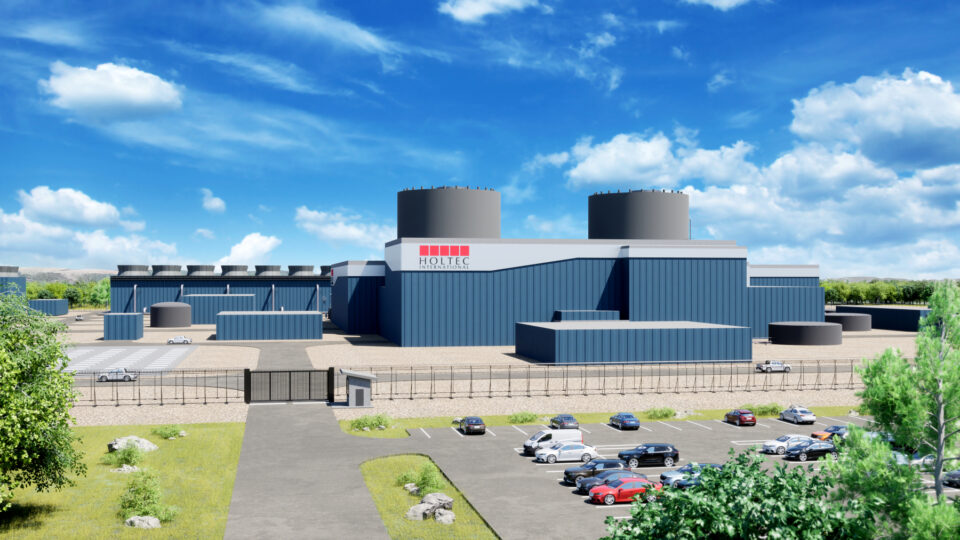Power up: Eden man playing key role in driving Utah’s nuclear future
- Emy Faulkner Lesofski, director of the Utah Office of Energy Development, center, Holtec President of Global Clean Energy Rick Springman, right, and Hi Tech Solutions President, Chief Operations Officer and co-founder Chris Hayter, left, pose for a photo after signing a memorandum of understanding in Salt Lake City on April 29, 2025.
- A rendering of a small modular nuclear reactor.
- Emy Faulkner Lesofski, director of the Utah Office of Energy Development, center, Holtec President of Global Clean Energy Rick Springman, right, and Hi Tech Solutions President, Chief Operations Officer and co-founder Chris Hayter, left, pose for a photo after signing a memorandum of understanding in Salt Lake City on April 29, 2025.
- Holtec President of Global Clean Energy Rick Springman, left, and Hi Tech Solutions President, Chief Operations Officer and co-founder Chris Hayter pose for a photo in the State Capitol Building in Salt Lake City on April 29, 2025.
How will Utah have the power it needs for the future?
It’s a massive question that encompasses a wide range of possibilities, but one Eden man is at the forefront of making sure the state has plenty of energy in the coming years.
Chris Hayter, who lives in Eden, is the president and chief operations officer of Hi Tech Solutions LLC, a Kennewick, Washington-based company that provides nuclear services around the world.
Now, he and partners like Holtec International are on the verge of bringing nuclear power to the Beehive State.
“I recognized that Utah hadn’t yet fully embraced commercial nuclear power, particularly in the advanced nuclear technologies we’re working with,” Hayter said in a phone interview earlier this month. “The West, and especially Utah, currently lacks a substantial nuclear footprint of true commercial value. Our vision is to create a robust infrastructure — what we are calling an ecosystem — for nuclear power right here.”
Start talking about nuclear power and immediately some people get uncomfortable, due to historic incidents, Hollywood portrayals and concerns about waste impact.
But Hayter understands nuclear power far better than most because of his background. He has spent much of his career working in nuclear power maintenance.
“People often express concerns about radiation exposure,” Hayter said. “I have personally worked in nearly every area of a reactor, including the most challenging environments. That experience has given me a deep understanding of the actual risks involved, which are far less than most people assume.”
He noted that while he has experienced more radiation exposure than the average person, it’s comparable to the cumulative dose an airline pilot receives over a career.
“I’m in good health today, and it’s important to understand that radiation exposure from regulated commercial nuclear power is tightly controlled and monitored,” Hayter said. “In fact, the health risks from low-level radiation exposure in our industry are lower than many lifestyle risks people willingly accept, such as smoking or poor dietary habits.”
According to studies by organizations like the World Health Organization and the National Academy of Sciences, low-dose occupational radiation exposure has not been conclusively linked to significant long-term health effects.
“Overall, it’s an incredibly safe industry,” Hayter said. “We prioritize safety above all else — both for our workforce and the public. While nuclear energy does produce waste, we are the most highly regulated industry in the United States. And it’s an industry that is critical to a clean energy future.”
He also highlighted that many people don’t realize spent nuclear fuel rods can be used in cancer treatments and that all the nuclear waste generated by the U.S. could fit within a single football stadium — a significantly smaller footprint compared to the discarded equipment from wind and solar energy, which also involves hazardous materials.
Hayter has witnessed the economic and energy benefits of nuclear power around the world and wants to bring that prosperity to Utah as well.
“We need clean, reliable baseload power, and we have the opportunity to produce it right here in the Intermountain West,” Hayter said. “That’s an exciting prospect. I never imagined being part of something as impactful as this energy resurgence.”
“An abundance of energy doesn’t just power homes and businesses — it drives economic growth, creates good jobs, improves health care access, strengthens schools and enhances our infrastructure. Power plants are engines of economic prosperity, and that’s a powerful thing.”
Hayter also emphasized his belief in taking care of people. Together with his partner, CEO and co-founder David Williams, Hi Tech Solutions has made employee well-being a top priority, knowing that a supported workforce leads to better outcomes.
“We’ve brought together an incredible team,” Hayter said. “Many of them had been overlooked or left behind by other industries, but we focused on retraining and empowering them to be part of something greater. When you invest in people, what you get in return is truly remarkable.”
With Hayter spearheading the effort, Hi Tech Solutions, Holtec International and the state of Utah signed a memorandum of understanding, or MOU, at the beginning of May that “commits the collaborating partners to a robust, locally driven strategy, ensuring significant benefits for the region through sustained innovation, economic growth, and environmental stewardship,” according to the Hi Tech Solutions press release.
“Hi Tech Solutions is honored to have led the strategic groundwork for this transformative partnership–from fostering strong workforce and utility alliances to detailed development planning and direct engagement with state leadership,” Hayter said in the release. “This MOU validates Utah’s visionary leadership and shows what’s possible through collaboration, foresight, and disciplined execution. At HTS, we are fully committed to building a sustainable energy future that empowers our communities and workforce to lead the way.”
The goal, Hayter explained, is for Utah to participate in the entire value chain — from workforce development and manufacturing to the construction and long-term operation of nuclear facilities.
“I believe Utah can lead the way,” Hayter said. “We have an opportunity to educate both the public and local governments on how to become not just consumers of energy but producers of it. That’s the vision.”
Hayter’s passion for Utah is also clear.
“I love Utah,” Hayter said. “I love its people, its unique culture and its incredible landscapes. Raising my kids here has been a blessing, and I’m committed to creating opportunities for others to build meaningful, lasting careers in this great state.”











